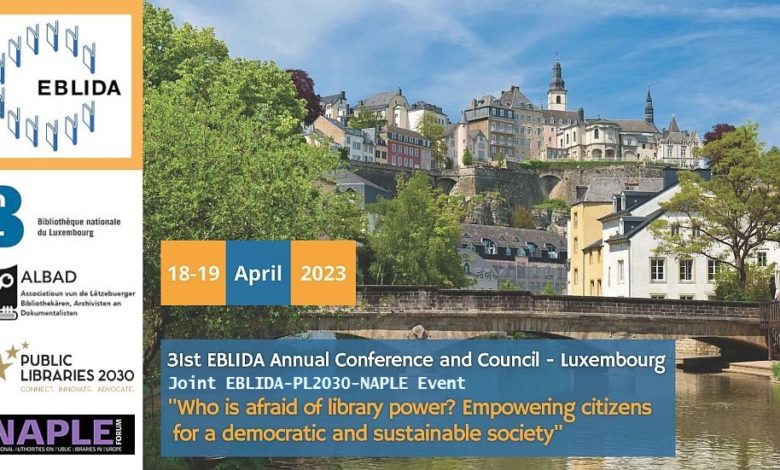artikel uitgelichtMaatschappelijk leiderschap
Libraries as essential democratic institutions in the new public arena
Lecture and workshop at the annual European conference in Luxembourg

How can public libraries stay strong in the new medialandscape and the new relations between citizens and politics in this new public arena? Of course this is about strategies and public leadership! That was the topic of my workshop and the vivid and inspirational debate with executives of public libraries from many European countries at their annual conference in Luxembourg. Here are some of the insights and ideas that I took from these encounters.
a. The old strategy of public services to lean only on politics and political support has grown less effective. Now all politicians are aware of the power over public opinion of the public itself. Their own political future depends on this public support and the judgment of the #permanentpublicgrandstand as I called it in my book of 2018 (see for example my lecture at Wellington, New Zealand). So, politicians will be hesitant to support public libraries, especially when an influential part of the public is not and now can show this publicly! Libraries now need their own exlicit and visible support of these citizens with this bigger public power. This support must be addressed at what they are doing, the public values they stand for and realize, like in their actvities of education, emancipation and information gathering, what it costs and how it is funded. This new public leadership certainly must help them to address scandals and public turmoil, when they incidentally arise. Maybe this is the biggest change for the library executives: they are now not only civil servants, but must also be public leaders and social entrepreneurs!
b. The old monopoly of public services in their domain is ended. This simple supply side attitude will not work, as demand site is now more powerful (following the analysis of Matjaz Gruden, one of the other speakers), including even new civic initiatives on books, information and debate. These new initiatives should be adopted and supported by the local public libraries, like in back office support, public communication and reputation and introducing the present public agenda. Problems with this new demand side can be that it is only protest or is not very democratic itself. It can also be narrowminded in a political or even scientific sense, as the current request for censorship, based on ‘family values’ or ‘creationism’ shows in the USA. This is no reason to not look at their importance from a civil or public perspective. By cooperating, while trying at the same time to convince them of the democratic values that libraries themselves try to uphold, it can certainly help modernizing the work and image of public libraries!
c. There is still a public, democratic role in the area of modern information and media, although it is much more commercialized now. It is dominated by Big Tech, platforms, search engines. These are all commercially based, some with explicit costs, some with the hidden cost in giving your personal data for free to be commercially used elsewhere (like in advertising). This public role here is about education to navigate, to learn to search on your criteria and interests to new information, maybe even to write or stream your own thoughts and observations on the internet. The democratic fight, both in mssion and in funding, for libraries is about this open access, open search and open communication. Increasingly this is now done through platforms as the new model of communication, exchange, peerreviews and choice. Maybe it is worthwhile for public libraries to create their own digital platform, further developing their already strong physical position in this area, for their local community to exchange supply and demand about data, information and debate?
d. Work for your independence and getting closer to citizens to public/private funding: maybe the old truth is now becoming too clear: the one who is funding determines your strategic possibilities and the domain of operation. When that funding comes exclusively from politics and public administration there can be an increasing problem. That they listen too much to citizen protest and want to censor and limit the open access to information, on the one hand. Or, just the opposite, that they want to restrict public libraries (including the use of budgettary constraints) to the tasks of the last 20 years, which was a totally different place in the arena of data, information and debate. All these developments can, maybe should open the gate to more private funding, while keeping the public funding. This leads to a better mix of public and private funding and so, to independence of public administration and their unsteady wishes. I mean of course private, to avoid common misunderstanding, here in the sense of ‘private-for-public‘ as in philantropy, volunteering (which was always big in libraries) and crowd funding.
My conclusions from these discussions and many conversations in the conference are mainly:
1. Public libraries should be very aware of these new strategic arena, because the most threatening scenario is that new citizen initiatives and old politics find each other in trying to censor what is the scope of their public task and to what kind of data and information libraries should be an access to for the public.
2. It is not working very effectively to only publicly communicate when you’re in defence, like in case of a political discussion or complaints and scandals. Libraries should be at the forefront of public debate and continuously be visible on the internet and relevant platforms. This is because in my analysis this new #thirdmediachannel will win in agenda setting and political councils and classic media will follow it (see for example my reflection on my lectures in Finland and Canada). It could be the right thing to build an open and visible support group, a fan club, for the mission and relevance of this public library.
Public libraries are now at the strategic front of a battle for democracy and democratic values, as the European Union in its latest recommendations has acknowledged. With this new strategic importance comes a big question about their current strategic intelligence and public leadership. I am certainly positive about the level of this, as I met in Luxembourg!


